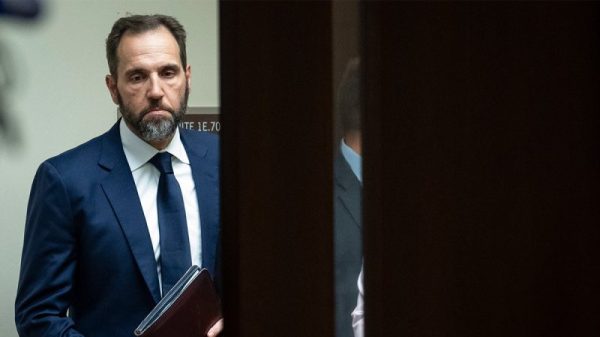The House bipartisan working group on paid leave has released a modest, draft framework aiming to enhance access to paid family leave.
The framework, which the group says focuses on policies with “current consensus,” is a significant step in the quest for federal paid leave, which has divided Congress for decades.
Just one year shy of the group’s first anniversary, members unveiled a four-part framework to increase paid leave to more people through a combination of private-public, state-based partnerships backed by the federal government and federal tax incentives for small business to provide paid leave.
The group, led by Reps. Chrissy Houlahan (D-Pa.) and Stephanie Bice (R-Okla.) and including Reps. Colin Allred (D-Tex.), Mariannette Miller-Meeks (R-Iowa), Haley Stevens (D-Mich.) and Julia Letlow (R-La.), was intentionally kept small. Bice and Houlahan, both mothers who got to know each other because they shared a hallway and sat on the House Armed Services Committee together, formed the group with low expectations. They promised no legislative text nor a framework. They weren’t sure if the six members would ever agree.
The United States is one of the few countries that does not offer a paid parental leave program for new mothers. A growing number of nations are also now offering paid leave for new fathers, leaving the United States far behind most countries on that metric as well. One-quarter of all U.S. workers have access to paid family leave from their employer, according to the Bureau of Labor Statistics. The Family and Medical Leave Act, which Congress passed 30 years ago, protected the jobs of some workers taking leave, but they don’t have to be paid during it.
The group held half a dozen meetings with a wide variety of business groups, unions, public interest organizations and state and local officials to hear input about what is working, what’s not and what’s needed for paid leave. Fourteen states and the District of Columbia have implemented some form of paid leave program.
The four-part framework aims to fill in gaps to paid leave across the country with federal grants that would help, but not require, states to implement or enhance their own paid leave programs. It would create an Interstate Paid Leave Action Network (I-PLAN) to help streamline programs across states. The proposal would enhance tax credits that already exist to incentivize small businesses, especially those with low-income workers, to provide paid leave. It would also allow small businesses to pool resources to more easily provide paid leave to their employees.
At this stage, the framework doesn’t define who would be eligible for paid leave, such as just parents or, more broadly, caregivers and what sort of benefits would be provided to the employee. Nor does it create a federally funded paid leave program for all workers, something that Democrats have been pushing for a decade in the Family Act, but Republicans have long opposed.
Because it’s just a framework, there is no cost assessment, but members said they would strive for any proposal to be paid for or offset. Figuring out how to pay for it, however, could be difficult. Houlahan and Bice say they want to turn it into legislation after gathering input from key players over the next couple of months.
In December, they joined a revamped bipartisan group of senators led by Sens. Kirsten Gillibrand (D-N.Y.) and Bill Cassidy (R-La.) working on paid leave, requesting additional input from about three dozen advocacy, business and interest groups about what paid leave policies would be effective, necessary and fiscally possible. Those results are due at the end of January and will help to inform both groups on how to craft legislation.
Even if the framework becomes bipartisan legislation, chances of passage are low in this legislative session. This Congress has been the least productive in 50 years, passing just 29 bills that were signed into law.


































